SEXUAL HARASSMENT POLICY
A sexual harassment policy is your foundational framework that sets out how you will prevent and respond to sexual harassment at work. You can also use a policy to demonstrate your commitment to ensuring safer work spaces in the music community in Aotearoa, and to start conversations about how you can work together across the industry to bring about cultural change.
WorkSafe states that anyone who is a ‘person conducting a business or undertaking’ (PCBU) should have a policy, whether they are a large company, a not for profit organisation, self-employed, or a sole trader.
Although WorkSafe has a template policy and other resources, the SoundCheck Aotearoa policy templates have been created with the music industry in mind and in some areas go further than WorkSafe to address the concerns raised during consultation sessions and training days run by SoundCheck Aotearoa.
There are two alternative templates available:
Note that the Sexual Harassment Policy template covers sexual harassment only. WorkSafe also recommends PCBUs have a policy on bullying and (non-sexual) harassment and have an example on their website. The Workplace Conduct Policy template references bullying, sexual harassment and racial harassment to provide sole traders and small businesses with one document that covers a range of workplace behaviours, with the emphasis is on sexual harassment.
If you are self-employed but only as a worker for others, then you may not need your own policy but can talk to those you work with about their policy.
You should use one of these templates as a starting point for creating your own policy, and tailor it to suit any circumstances that apply to you and your business. Each of the templates includes guidance notes within the text to assist you in doing this. You should also consult with those that work with you about your draft policy and ensure everyone is aware of it once implemented.
Remember that a policy alone will not prevent sexual harassment, so it is essential that you use the policy as the foundation and ensure your business, leadership, team and culture are all trained on the policy and how to use it, and are committed to taking practical steps to prevent sexual harassment. For ideas on practical steps in the context of live music, see HERE.
SUPPORT
If you are looking for information or support about sexual harassment that you or a friend or colleague have experienced, you should check out the policy of the business involved and Support: How to Get Help.
RESOURCES
We have created the following resources to support you in creating your own policies, and to give guidance in specific areas. These include documents you may choose to attach to your own policy and/or that you may want to refer to as guidance if you are reporting, or responding to a report of, sexual harassment in your workplace:
Support: How to Get Help: Details of the support options available including contact details for external providers of support and advice
Continuum of Workplace Behaviours: a diagram showing the range of workplace behaviours (includes examples of sexual harassment)
External resolution options: further information about the external options available for resolution of reports of sexual harassment.
Guidance on responding to a disclosure of sexual harassment (flowchart)
Training guidance: Overview and contact details for sexual harassment training providers
Definitions: explanations of terms and concepts that are used throughout our documents and website
EXAMPLES
We have included examples of policies below so you can see how others have developed their own (SoundCheck Aotearoa has provided these links to third party websites as useful examples and does not necessarily endorse the organisations concerned).

